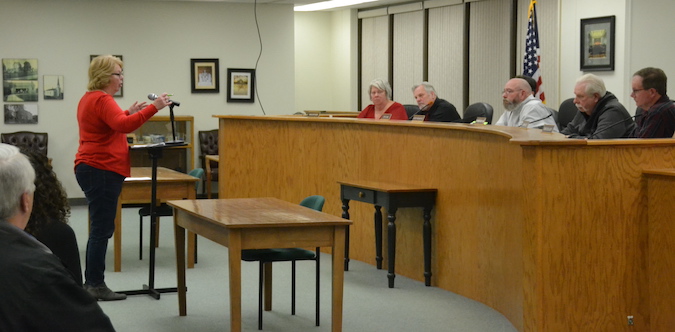Big costs, no quick fix for Shelby residents facing water woes
Construction costs have soared, grants haven’t kept pace to put in new waterlines

Photo by Tom Rivers: Shar Pratt speaks during Monday’s Shelby Town Board meeting and asks the Town Board to push for public water for many of the residents suffering from too little water in their wells. “This is 2023,” she said. “It’s a health and safety priority.”
SHELBY – Town residents, many of them desperate for public water, won’t have a quick or cheap fix for getting a public waterline by their homes, residents were told on Monday.
Construction costs have soared since the start of the pandemic about three years ago – by 2 to 2.5 times. And grant amounts from the state and federal governments haven’t kept up with the rising costs.
Shelby has about 70,000 linear feet without public waterlines – nearly 14 miles. To bring an 8-inch waterline to all of the spots would be about $12 million, said Jason Foote, an engineer and project manager with Clark Patterson Lee.
The town would need about $10 million in state and federal grants to make that project affordable for residents. The state comptroller sets a threshold for affordability for public water projects at $1,040 in annual expense to residents. Shelby residents pay an average of $478 for their water bills. That leaves about $552 left for the debt for a water district to under the state comptroller threshold.
The construction estimates are currently about $125 per linear foot, which is much higher than a few years ago, Foote said.
“There is high demand for contractors and low supply (for materials) – which is the direct opposite of what you need for low pricing,” he said.
Three town residents spoke during the meeting and urged the board to try to bring public water to residents. They said their wells have been nearly depleted. One woman said her family limits showers to 2 minutes and hauls in water.
“It’s horrible,” said Karrie Cronkhite of Wheeler Road. “In 2023, people shouldn’t have to live this way.”
She said her well has progressively worsened in the past three years. She estimated she is spending $100 a month on buying water in jugs and about $25 a week at the laundromat.
Shar Pratt of Martin Road said her well has largely dried up since last August. Her husband John, a member of the Town Board, has to lug water to the house. They put in auxiliary tanks for water so they can keep flushing their toilets, doing dishes and laundry at home. But it’s a lot of work to haul water two to three times a week.
“This is 2023,” Pratt said. “We shouldn’t have to live like this. It’s a health and safety priority.”
Andrea Walton of Maple Ridge Road said she is one of six homes on Maple Ridge without public water access. They have been asking the town the past three years to find a way to bring public water to that area.
Foote, the engineer, suggested the town try to break the project in multiple water districts to try to maximize the state and federal grants. He broke the areas without water into three potential projects (which could be modified).
For part 1 he suggested part of Maple Ridge Road (between Salt Works Road and Charles Street), Sanderson Road, Waterworks Road, Munzel Road and Martin Road. That includes 36 equivalent dwelling units on about 26,000 linear feet. Foote said the estimated construction would be about $4.5 million and would need $3.6 million to $3.8 million in grants to be affordable to residents.
Part 2 would be as $3.3 million project with 32 EDUs over about 20,000 linear feet and include Wheeler Road, Hemlock Ridge Road and Townline Road.
Part 3 would be about $4.2 million with 18 EDUs with part of Martin Road, Townline Road (including in Barre), Barber Road and Smith Road in Barre.
Foote stressed that no district boundaries are set, and those areas identified in his proposal could be shifted to make a district larger or smaller.
“I think it’s going to be smaller projects,” Foote said about the size of the water districts. “You need to prioritize the areas.”
One of the funding agencies, the federal Rural Development, wants to spread out its grants to many communities so it’s unlikely it would give Shelby a massive grant to cover the entire town currently without public water, Foote said.
He presented an option for three different phases, but he said it could be reworked to two phases, or even four phases.
He urged the town to start working on grants and other government assistance.
Scott Wengewicz, the town supervisor, said he supports pursuing as many avenues as possible for grant funding.





































































